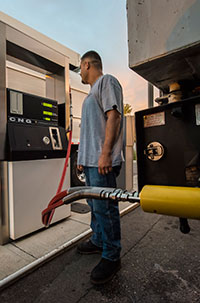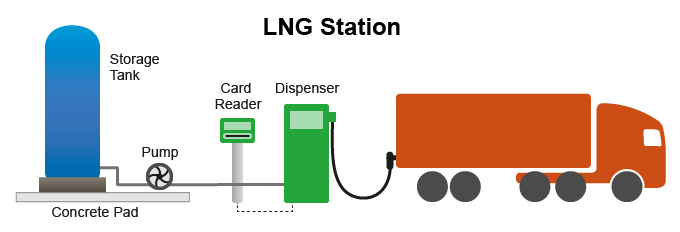Natural Gas Fueling Stations

As of 2023, more than 700 public compressed natural gas (CNG) fueling stations are available in the United States. Approximately 50 liquefied natural gas (LNG) fueling stations are available, mostly in areas that service the long-haul trucking industry. For consumers, fueling natural gas vehicles at home can be possible with the installation of a small fueling appliance.
Station Locations
Find natural gas (CNG and LNG) fueling stations by location or along a route. Use the Advanced Filters to search for private and planned stations, as well as natural gas fueling stations to match certain search criteria.
Infrastructure Development
CNG and LNG stations vary considerably. CNG stations require more equipment and configuration, while LNG stations require less equipment, but more safety precautions during fueling.
The Alternative Fueling Station Locator allows users to search for public and private CNG and LNG fueling stations. Suggest new natural gas stations for inclusion in the Station Locator using the Submit New Station form.
CNG Stations
There are essentially three types of CNG stations: fast-fill, time-fill, and a combination of these two. The type of station needed is dependent on the application. Typically, retail stations use fast-fill, and fleets that have central refueling and the ability to fill overnight use time-fill. All public fueling stations offer a fast-fill option.
LNG Stations
LNG stations are structurally similar to gasoline and diesel stations in that they have a storage tank, meters, and dispenser. LNG dispensers deliver fuel to vehicles at pressures of 30 to 120 psi. Because LNG is stored and dispensed as a super-cooled liquefied gas, protective clothing, face shield, and gloves are required when fueling a vehicle, and personnel must also be trained on fueling procedures.
There are three options for LNG fueling: mobile, containerized, and permanent large stations. In mobile fueling, LNG is delivered by a tanker truck that has on-board metering and dispensing equipment. A starter station, or containerized station, includes a storage tank, dispensing equipment, metering, and required containment. A permanent station has greater storage capacity and is tailored to meet fleets' needs.

Cost of Installation
The cost of installing natural gas infrastructure is influenced by station size, capacity, the type of natural gas (LNG, CNG, or both) dispensed, and the way natural gas is dispensed (fast-fill or time-fill). According to a report published by the National Laboratory of the Rockies, costs of a CNG fueling station can range up to $1.8 million, depending on the size and application. Smaller fueling units average $10,000, including engineering, equipment, and installation. LNG fueling station costs are highly variable, ranging from one to several million dollars. Costs are dependent on factors such as storage capacity, station design, and the services needed to build it.
In addition, it is important to work with your local utility, which can help determine whether the appropriate level of gas pressure is available at your location, whether the gas quality and moisture content are appropriate, and whether your gas service can support the needed gas flow. Additional funding may be necessary to address these needs.
Safety
There are many safety guidelines that need to be considered when developing infrastructure, including the National Fire Prevention Association's NFPA 52 Vehicular Natural Gas Fuel Systems Code, which applies to the design and installation requirements of CNG refueling facilities. Consult your local fire marshal or Clean Cities and Communities coalition for help.